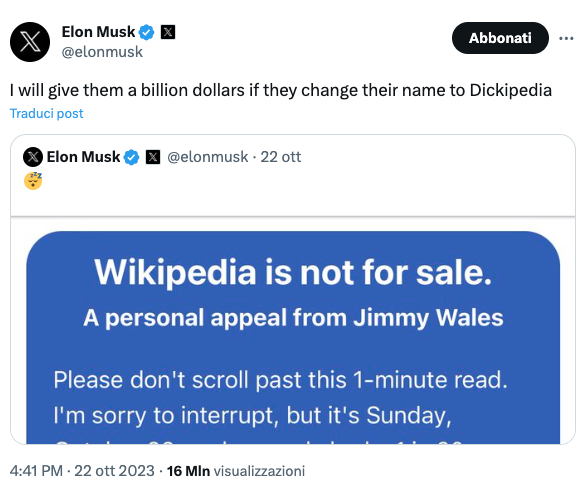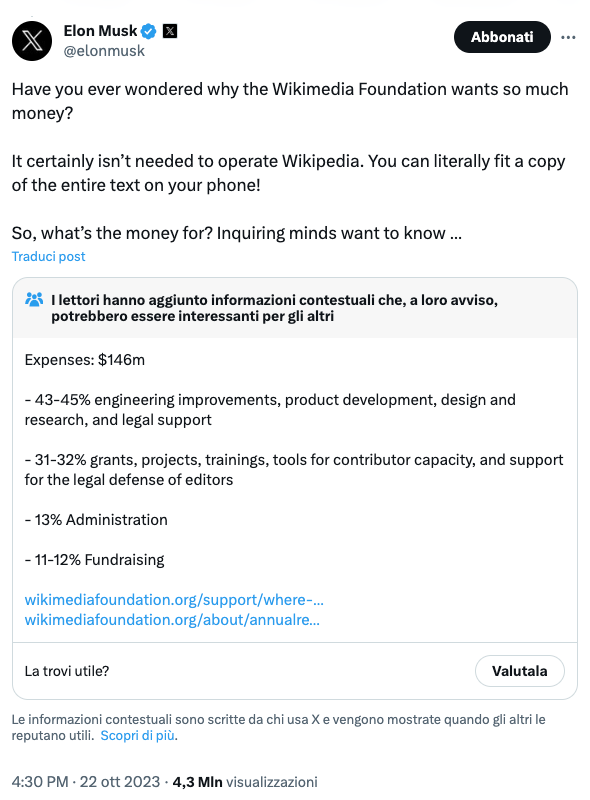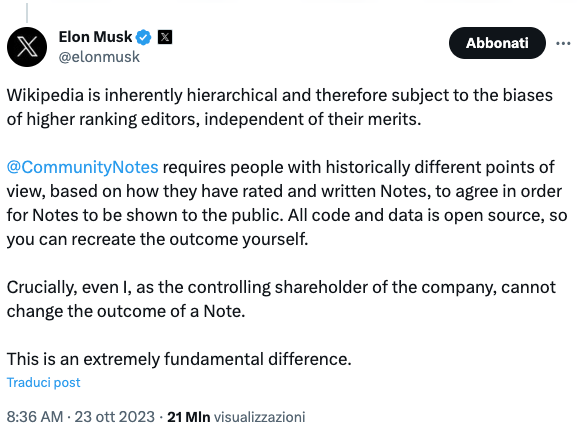Elon Musk’s war on Wikipedia

The dispute between Elon Musk, owner of to his Community Notes would have a lot to learn (even if not everyone agrees). Facts and poisons
Wikipedia, the great global, free and collaborative encyclopedia born in 2001 from the mind of Jimmy Wales and Larry Sanger, is constantly looking for donations. Last Sunday he received a seemingly very tasty one. Billionaire Elon Musk has in fact offered one billion dollars. However, in exchange for something difficult to accept…
MUSK'S INDECENT PROPOSAL TO WIKIPEDIA
“I will give them a billion dollars if they change their name to Dickipedia,” the histrionic entrepreneur wrote on his X (formerly Twitter) last Sunday, provocatively referring to Wikipedia's request for donations. “It would be in the interest of accuracy,” stressed Musk, who had previously posted a screenshot of Wales stating that the website is “not for sale.”

BUT WHY DOES WIKIPEDIA CONTINUALLY ASK FOR MONEY?
Musk, who is not the first time criticizing Wikipedia, or rather the Wikimedia Foundation (an organization created specifically to make Wikipedia profitable, which is actually a non-profit and does not pay volunteers), last Sunday he published several posts in which he lashed out against it.
“Have you ever wondered why the Wikimedia Foundation wants so much money?” he wrote, adding that money is definitely not necessary to run Wikipedia. “You can literally put a copy of the entire text into your phone! So, what is the money for? Inquiring minds want to know…”.
An investigation by Report at the beginning of the year had already raised doubts and discovered gray areas on the issue.
COMPARISON WITH X'S COMMUNITY NOTES
To this question, Musk responded by attaching an explanation provided by Community Notes , the billionaire's answer to Wikipedia.

Community Notes, at least according to Musk, is a crowdsourced fact-checking program launched a year ago to address misinformation about X (which, admittedly, does not excel in terms of reliability and accuracy ). However, for a former employee of the social platform, it is "an imperfect replacement for the Trust and Safety staff", the department responsible for content moderation that was dismantled upon Musk's arrival. “You can't outsource the work to the community,” he added.
HOW COMMUNITY NOTES WORKS
Community Notes, currently publicly visible in the United States, "aim to create a more informed world by allowing users on X to collaborate by adding contextual information to potentially misleading posts," we read on the X blog . “Contributors can leave notes on any post. If a sufficient number of collaborators, with different points of view, consider a note useful, it will be shown publicly on a post”. Ideally democratic but not necessarily reliable…
“This is an open and transparent process – he continues -, which is why we have made the community notes algorithm open source and publicly available on GitHub, along with the data that powers it, so that anyone can check, analyze or suggest improvements” .
This is why, according to Musk, if "Wikipedia is intrinsically hierarchical and therefore subject to the prejudices of higher-level editors, regardless of their merits", Community Notes aggregates "people with historically different points of view", whose opinion does not represent the vision of X because not even he, as the controlling shareholder of the company, can change the outcome of a note.
“This is an extremely fundamental difference,” concludes Musk.

BUT DOES IT REALLY FIGHT DISINFORMATION?
However, according to the community's own contributors, recently interviewed by Wired , Community Notes "is not up to the task of policing the platform for misinformation, and none of them believe the program will improve in the coming months if it remains in its current form." current".
“It's much harder to deal with misinformation when there isn't the top-down moderation that Twitter had in the past, because accounts intentionally spreading misinformation would have been suspended before they even caused any harm,” the former employee said , adding that “relying on Community Notes is not a good thing” and “is no substitute for proper content moderation.”
Alex Mahadevan, program director of the Poytner Institute's MediaWise initiative that promotes digital literacy, noted that the algorithm's flaw is that posts must gain consensus across ideological divides to be published. “Maybe it would have worked four years ago,” he said, but “today it no longer works, because 100 people on the left and 100 people on the right will disagree about the effectiveness of vaccines.” What is needed, he explained, is “inter-ideological agreement on the truth,” and in an increasingly partisan environment, reaching this consensus is nearly impossible.
THE ALGORITHM BEHIND COMMUNITY NOTES
As Japan Times writes , “although the algorithm's complex mathematical formula is intended to discourage manipulation, it is not foolproof and requires a large number of evaluators.” Julien Pain, host of the “True or Fake” program on Franceinfo , stated that in France there are groups that exploit the algorithm to promote their ideas.
“A note is interesting when it adds a little factual context to nuance a statement,” Pain said. But these simply declare that it is false and try to discredit the person."
This is a machine translation from Italian language of a post published on Start Magazine at the URL https://www.startmag.it/innovazione/la-guerra-di-elon-musk-a-wikipedia/ on Tue, 24 Oct 2023 10:23:54 +0000.
